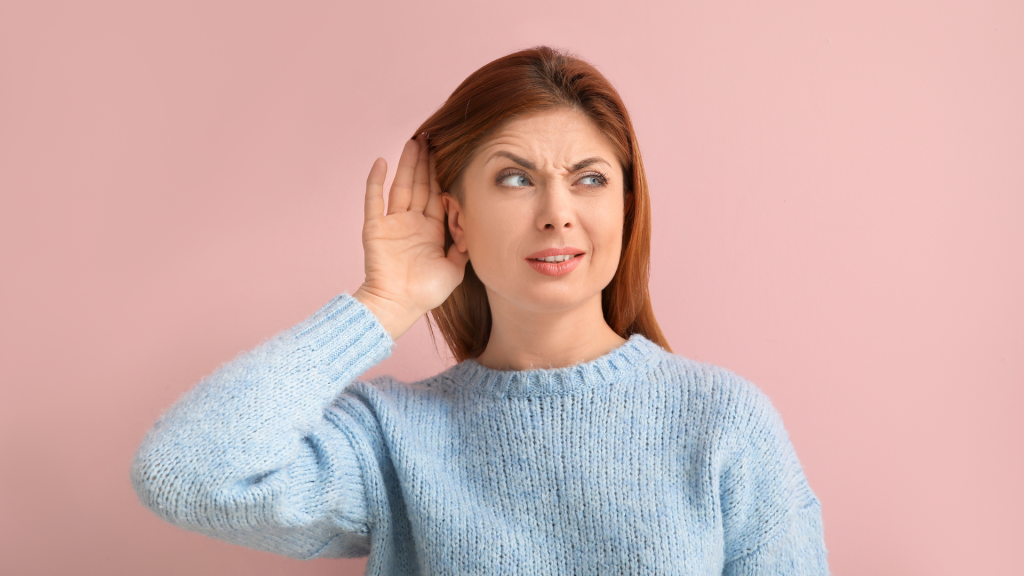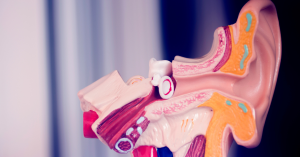Introduction: Understanding Day-to-Day Hearing Fluctuations
Have you ever woken up to crystal-clear hearing—only to feel like you’re underwater by lunchtime? If your hearing seems to change from one day to the next, you’re not imagining things. You might be asking yourself, “Why does my hearing fluctuate day to day?” The answer isn’t always straightforward, but it’s more common—and more explainable—than you might think.
Daily fluctuations in hearing can be frustrating, confusing, and even a little scary. One moment, you’re engaged in conversation with ease. The next, you’re asking people to repeat themselves, struggling to understand phone calls, or wondering if your hearing is “going bad.” This inconsistency can shake your confidence and make you feel like you’re constantly trying to recalibrate.
The good news? These ups and downs often have logical causes—many of which are temporary or manageable. From environmental changes to stress levels to underlying medical conditions, there are numerous factors that can impact how well you hear on a given day.
In this article, we’ll unpack the surprising science behind hearing fluctuations, explore common triggers, and offer practical tips for managing the unpredictability. If you’re ready to stop second-guessing your ears and start understanding what’s really going on—keep reading.
Why Does My Hearing Fluctuate Day to Day?
It’s one of the most confusing and unnerving experiences—your hearing feels fine one day, and the next, it’s dull, muffled, or completely off. You start to wonder if something’s seriously wrong, or worse, if your hearing is declining for good. But daily fluctuations in hearing aren’t necessarily a sign of permanent damage. In fact, they often point to temporary changes in your body or environment.
The Difference Between Hearing Loss and Hearing Fluctuation
First, let’s make an important distinction: hearing loss refers to a consistent, measurable reduction in your ability to hear certain sounds or frequencies. It can be mild or severe, and typically stays the same or gradually worsens over time unless treated.
Hearing fluctuation, on the other hand, refers to a change in your hearing ability that varies—often unpredictably—from one day to another. You might experience:
- A sensation of fullness or pressure in your ears
- Occasional muffled or distorted sound
- Difficulty hearing in one ear but not the other
- Temporary improvement after rest or hydration
Unlike permanent hearing loss, these symptoms often come and go.
Temporary vs. Long-Term Fluctuations
Temporary fluctuations are typically caused by everyday factors—like fluid in the ear, sinus pressure, or even changes in atmospheric pressure. These episodes usually resolve on their own, or with minimal medical support.
Long-term or chronic fluctuations, however, may be a sign of something more serious, such as an underlying health condition like Meniere’s disease, autoimmune ear disorders, or even neurological involvement. These require closer monitoring and care from an audiologist or ENT specialist.
So when should you worry? A good rule of thumb: if your hearing changes dramatically, lasts for more than a day or two, or is accompanied by dizziness, ringing, or pain—get it checked out.
Understanding that fluctuations are a symptom—not a sentence—can help ease the anxiety they create. In many cases, your hearing isn’t failing you—it’s simply reacting to change.
Common Causes of Daily Hearing Changes
Your hearing can be surprisingly sensitive to changes in your body and surroundings. In fact, some of the most common reasons your hearing fluctuates from day to day have nothing to do with long-term damage—and everything to do with temporary, often treatable conditions. Understanding these can help reduce anxiety and point you toward solutions that work.
Earwax Buildup, Allergies, and Sinus Pressure
Let’s start with the basics. Earwax, while natural and protective, can become a problem when it builds up and blocks the ear canal. On some days, it may shift position slightly—partially affecting sound flow and clarity—leading to that “plugged” sensation that seems to come and go.
Allergies can cause inflammation of the Eustachian tubes, which help equalize pressure in your ears. When these tubes are blocked, fluid can build up behind the eardrum, leading to muffled hearing or a sense of fullness. The same goes for sinus congestion—which can put pressure on your ears, distort sound, and affect your hearing in a temporary but noticeable way.
These issues often fluctuate with the seasons, your environment, or even something as simple as sleeping on one side too long.
Stress, Fatigue, and Hydration
Believe it or not, your emotional and physical state can directly affect your hearing. When you’re tired, dehydrated, or under high stress, your body’s overall function—including circulation and neural processing—may be compromised.
- Stress increases cortisol, which can cause inflammation in the body—including the inner ear. It may also increase your sensitivity to tinnitus (ringing in the ears) or make you more aware of subtle changes in your hearing.
- Fatigue can cause your brain to misprocess audio signals, making it feel like you’re not hearing as clearly.
- Hydration plays a role too—your inner ear relies on fluid balance to function properly. Being dehydrated can make symptoms of dizziness, fullness, or imbalance worse, which affects your auditory perception.
Often, these internal factors come and go with your daily rhythm—explaining why your hearing might seem “off” some days and totally fine the next.
Medical Conditions That Cause Fluctuating Hearing
While many day-to-day hearing changes stem from temporary issues, sometimes they’re signs of underlying medical conditions. If your hearing frequently shifts in clarity, balance, or sensitivity—especially alongside other symptoms—it’s worth exploring the potential medical causes. Getting an accurate diagnosis can help prevent long-term damage and improve your quality of life.
Meniere’s Disease, Autoimmune Inner Ear Disease (AIED), and Infections
One of the most well-known culprits behind fluctuating hearing is Meniere’s disease. This inner ear disorder is characterized by:
- Sudden hearing changes
- A feeling of fullness in the ear
- Tinnitus (ringing)
- Episodes of vertigo
These symptoms tend to come in waves and can last for hours. Meniere’s is believed to be linked to abnormal fluid buildup in the inner ear, and while it’s chronic, it can be managed with medication, dietary changes, and sometimes surgical options.
Another lesser-known cause is Autoimmune Inner Ear Disease (AIED). In this condition, the body’s immune system mistakenly attacks healthy inner ear tissues, leading to rapid, often fluctuating hearing loss in one or both ears. AIED may be associated with other autoimmune disorders like lupus or rheumatoid arthritis and often responds well to corticosteroids or immunosuppressants if caught early.
Don’t underestimate ear infections, either. Chronic or recurrent middle ear infections (otitis media) can cause temporary hearing loss that fluctuates as the infection worsens or heals. Inner ear infections (labyrinthitis) can also impact both hearing and balance, and while many clear up with time or medication, they can leave lingering fluctuations for days or weeks.
Medication Side Effects and Hearing Threshold Shifts
Some medications—especially ototoxic drugs—can damage the ear’s delicate structures. These may include certain antibiotics, chemotherapy agents, or high doses of aspirin. Depending on how your body reacts, hearing changes may come and go or become more noticeable over time.
In addition, your hearing threshold—the quietest sound you can hear—can temporarily shift due to stress, illness, or even noise exposure from the day before. These shifts can mimic the sensation of hearing loss, but they’re often temporary and reversible with rest and recovery.
If you notice regular patterns in your hearing changes—especially linked to other symptoms—it’s time to involve a medical professional. The sooner you get clarity, the sooner you can take action.
Environmental & Lifestyle Triggers
You might be surprised how many everyday situations—ones you probably don’t even think twice about—can cause your hearing to change temporarily. From the air you breathe to the noise around you, external influences play a major role in how your ears function. If you’ve ever noticed your hearing feels different depending on where you are or what you’ve been doing, you’re not alone.
Weather, Altitude, and Barometric Pressure
Your ears are incredibly sensitive to atmospheric pressure, especially the middle and inner ear. Changes in weather—particularly rapid drops in barometric pressure—can cause the Eustachian tubes (the small canals that balance pressure in your ears) to malfunction. This might make your hearing feel muffled or blocked, especially during storms, heavy humidity, or drastic temperature shifts.
Altitude can have a similar effect. If you’re flying, hiking, or driving through mountains, the pressure changes can affect your ears’ ability to regulate themselves. This results in the classic “popping” sensation—and sometimes, temporary hearing distortion.
Even everyday weather fluctuations can alter how sound travels. Humid air, for example, carries sound differently than dry air, subtly changing your perception of volume and clarity.
Noise Exposure and Sleep Quality
Loud environments don’t just harm your hearing in the long term—they can affect your hearing short-term too. After a night out at a loud concert or a day spent using power tools, you might experience temporary threshold shifts—a dull, slightly numb feeling in your ears. These usually reverse within 24–48 hours, but frequent exposure can lead to permanent loss.
And let’s not overlook sleep quality. Poor rest affects your brain’s ability to process sounds and can heighten your perception of tinnitus or ear discomfort. Sleep deprivation can also weaken your immune system, making you more susceptible to inflammation and infections—two things that can directly affect hearing.
Add in factors like smoking, diet, and alcohol consumption, and you’ve got a cocktail of potential hearing influencers that can shift how you hear from one day to the next.
Understanding that your hearing doesn’t exist in a vacuum—it’s part of a whole-body ecosystem—can empower you to make lifestyle adjustments that bring more consistency to your hearing experience.
How to Manage and Monitor Hearing Fluctuations
Daily changes in hearing can feel unpredictable and unsettling—but with the right strategies, you can reduce their impact and even start to understand what triggers them. Whether your fluctuations are mild or disruptive, taking a proactive approach puts you back in control.
When to Seek Professional Help
The first step? Don’t wait too long to consult a specialist. If you experience:
- Sudden hearing changes lasting longer than 24–48 hours
- Hearing loss in only one ear
- Fluctuations accompanied by dizziness, pressure, or tinnitus
- Ongoing ear infections or discharge
…it’s time to see an ENT (ear, nose, and throat specialist) or an audiologist. They can run tests to determine the cause and suggest the right treatment, whether it’s medication, lifestyle changes, or hearing aids.
Many people delay this step because they fear bad news or assume “it’ll pass.” But the earlier a cause is found, the better the outcome—especially in cases like Meniere’s or autoimmune inner ear disorders.
Daily Habits, Hearing Logs, and Hearing Aids
Even if your fluctuations aren’t serious, you can do a lot to track and manage them. Start with a hearing diary:
| Date | Hearing Level (1–10) | Symptoms | Environment | Possible Triggers |
| Mar 1 | 6 | Muffled in left ear | Rainy, high humidity | Allergies |
| Mar 2 | 8 | Clear | Sunny, slept well | None |
Tracking patterns helps you identify triggers—like weather, fatigue, or stress—that affect your hearing. It also gives doctors valuable insight.
Hearing aids can be life-changing for those with chronic fluctuations. Today’s models are smart—they automatically adjust to changing environments and amplify speech while filtering background noise. Even if your hearing loss isn’t permanent, they can improve clarity during “off” days.
Other tips for consistency:
- Stay hydrated and manage stress
- Keep ears clean (but avoid cotton swabs!)
- Protect your hearing in loud environments
- Prioritize rest and nutrition
- Communicate your needs—ask people to speak clearly and face you
The goal isn’t perfection—it’s awareness and support. When you treat your hearing health like any other part of your wellness routine, those daily ups and downs start to feel a little less scary—and a lot more manageable.
Conclusion: Reclaiming Consistency in Your Hearing Journey
When your hearing changes from one day to the next, it can feel like you’re walking through life with the volume knob constantly shifting—sometimes without warning. It’s confusing, frustrating, and sometimes scary. But here’s the truth: you’re not powerless, and you’re definitely not alone.
Fluctuating hearing doesn’t always mean something serious is wrong—but it is your body’s way of signaling that something’s out of balance. Whether it’s fluid pressure, fatigue, diet, allergies, or a medical condition, those shifts in clarity are clues—not punishments.
The more you understand your hearing, the better you can care for it. Keeping a log, adjusting your lifestyle, seeking timely medical advice, and considering hearing technology are all valid, powerful tools to help you regain control.
Most importantly, trust yourself. You know your body better than anyone. If something feels off, it’s worth exploring. And if your hearing is up one day and down the next, don’t beat yourself up. You’re adapting, you’re learning, and you’re advocating for your own well-being.
Consistency begins with awareness. And by reading this, you’ve already taken the first step toward greater clarity—one day at a time.
Frequently Asked Questions
Can anxiety cause fluctuating hearing?
Yes, absolutely. Anxiety can increase tension in your body, elevate cortisol levels, and even constrict blood flow—all of which may affect your auditory system. It can also make you hyper-aware of any subtle changes, leading to a heightened perception of “bad hearing days.” Managing stress and anxiety often improves overall auditory clarity.
Should I be worried if my hearing changes every day?
Daily changes in hearing aren’t always cause for alarm—but if they’re frequent, sudden, or accompanied by pain, dizziness, or ringing, you should consult a healthcare professional. Fluctuations can be harmless or signs of underlying conditions. When in doubt, it’s best to investigate rather than ignore.
Will hearing aids help with fluctuations?
Yes, in many cases. Hearing aids can adjust to your needs in real-time, helping smooth out variations in volume or clarity. Even if you don’t have permanent hearing loss, hearing aids can offer clarity on days when your ears are “off.” Today’s tech is discreet, customizable, and built for real-life fluctuations.
Can food or drink affect my hearing temporarily?
They can. High sodium intake, caffeine, and alcohol can all impact fluid retention and circulation in the inner ear—potentially triggering temporary hearing changes, especially in people with Meniere’s disease. Staying hydrated and maintaining a balanced diet may help stabilize your hearing.
How do I know if it’s a sign of something serious?
Pay attention to patterns. If hearing loss comes on suddenly, affects only one ear, or includes vertigo, nausea, or tinnitus, seek help immediately. These can signal serious conditions like sudden sensorineural hearing loss or inner ear infections. Always err on the side of caution—early intervention is key.
What can I do today to stabilize my hearing?
Start with the basics:
- Hydrate
- Rest well
- Avoid loud environments
- Manage stress
- Track your hearing with a simple daily log
- Schedule a hearing evaluation if symptoms persist
Consistency in self-care often leads to consistency in hearing. And remember—you’re not at the mercy of your ears. You have more control than you think.






